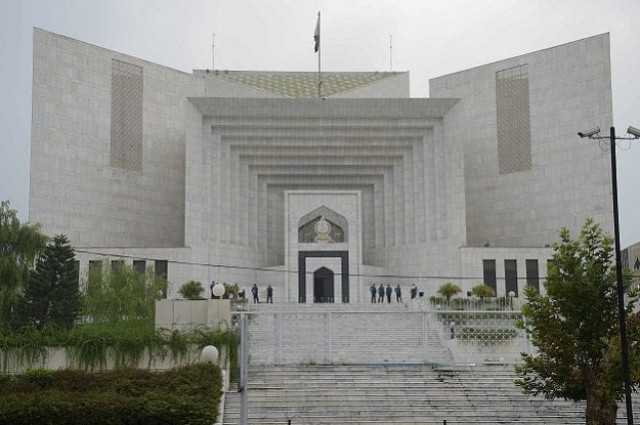CJP seeks justification for petroleum taxes
Says people are being tricked into paying high oil prices

Supreme Court of Pakistan. PHOTO: AFP
A three-member bench headed by Chief Justice of Pakistan Mian Saqib Nisar issued the directive while hearing a petition regarding excessive price hikes in petroleum products at the Supreme Court’s Karachi registry.
The top court summoned the FBR chairman in the next hearing with directives to present details of bids against the petroleum products.
During the course of proceedings, Chief Justice Mian Saqib Nisar expressed dissatisfaction over the briefing given by the deputy managing director of the Pakistan State Oil (PSO).
The chief justice maintained that the people were being tricked in the name of taxes on petroleum products.
“What is the justification of petroleum taxes?” the chief justice asked, saying, “We need records for each and everything.”
CJP reprimands Sindh govt for renting luxury cars
Top officials from several government departments, including secretaries of the petroleum and energy ministries as well as the FBR chairman and PSO managing director have been summoned for Friday.
They have been advised to present records including details of oil imports, auctions, prices and taxes of the past six months.
The chief justice was of the view that the process of petroleum imports lacked transparency.
“Which laws permitted the oil regulators to fix petrol prices at Rs62.8 per liter?” he asked.
In response PSO deputy managing director Yaqoob Sattar said that the country imported 266.6 million gasoline during the last month and added that PSO procured it at the best bid at Rs62.38.
He told the court that the government levy on gasoline was 9.8 per cent while another 3.83 per cent is imposed on account of IFEM (inland freight equalisation margin), leaving a profit margin of 2.55 per cent for oil marketing companies and a 3.35 per cent commission for dealers.
He added although the government raised the tax to 15 per cent on May 15, oil prices remained unchanged until June 1.
Oil firms take back case against OGRA over fee dispute
Oil marketing companies, however, reflected the increase on June 12, bringing per liter price of petrol to Rs91.96. “PSO already owes Rs300 billion as credit from different departments,” he revealed.
The chief justice asked if the PSO was obtaining loans from banks to meet its expenditures and at what percentage of interests, if any, it was paying to the lending institutions.
The PSO representative told the court that Rs95 billion of the total debt represented the bank loans for which the organisation pays Rs7 billions in annual interest.
The chief justice remarked that people were sceptic of the increase in oil prices and that they believed that the hikes were caused by the PSO-Ogra duo.
“We cannot allow such uninformed decisions pertaining to petrol prices,” CJP remarked, adding “Details of all accounts must be submitted.”
The FBR (in-charge) legal department told the court that the chairman was busy in election preparations until June 30.
The reply displeased the chief justice, saying the pressing issue oil price is more important than activities of the FBR chairman.
Govt removes ban on furnace oil imports as power demand rises
The court asked Advocate Faisal Siddiqui to partner up with Ogra to thoroughly investigate the mechanism behind petroleum prices.
The court also advised Siddiqui to present a report of his findings to the court.
The court has also ordered cancellation of leaves awarded to the PSO managing director and summoned him for Friday.
Speaking on the issue, Karachi Mayor Wasim Akhtar asked, “Why is the city being subjected to transportation surcharge?”
The chief justice vowed to come up with a lasting solution to the petrol prices.
The top court ordered the authorities concerned to deep dig into the complex issue before it passes verdict in favor of the public.



















COMMENTS
Comments are moderated and generally will be posted if they are on-topic and not abusive.
For more information, please see our Comments FAQ